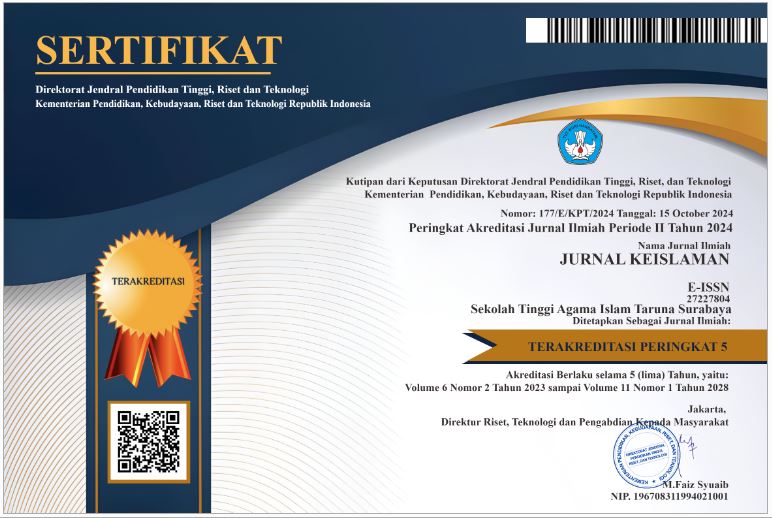Solusi Al-Qur’an dalam Mengatasi Pengaruh Media Sosial TikTok Terhadap Keagamaan Generasi Muda
DOI:
https://doi.org/10.54298/jk.v7i2.279Keywords:
TikTok, Young Generation Religion, Al-Qur'an, InfluenceAbstract
This research aims to determine the influence of TikTok social media on the religion of the younger generation from the perspective of the Koran. This research was conducted using the library research method, which includes analysis of literature such as the Al-Qur'an, hadith, journals, and related books. In the digital era, social media has become an important platform for the younger generation to express themselves and seek information. TikTok, as a popular application, allows users to create short videos with various interesting effects. However, its inappropriate use can have negative impacts, such as reducing valuable time, reducing a culture of shame, and spreading hoax news. This research found that TikTok has a significant effect on the religion of the younger generation, including the potential for antisocial behavior, wasting time, and decreasing Islamic values. To overcome these negative influences, the Qur'an provides important guidance, including commands to socialize well, make the best use of time, and maintain a culture of shame. This article offers a unique perspective on how the younger generation can use social media wisely and still retain their religious values through the teachings of the Koran. Thus, it is hoped that this research can provide practical and theoretical benefits for the younger generation and the general public in overcoming the challenges of using social media in the digital era.
Downloads
References
Abu Zakaria Muhyiddin Yahya An-Nawawi, Riyad As-Sholihin, Surabaya: Dar al-Ilmi.
Al-Imâm al-Hafîdz Ibn KatsÎr al-Dimisyqi, TafsÎr al-Qur’an al-‘AdzÎm, Jilid 4, Beirut, Darul Kutub al-Ilmiyyah, 2017.
Al-Imâm al-Hafîdz Ibn KatsÎr al-Dimisyqi, TafsÎr al-Qur’an al-‘AdzÎm, Jilid 1, Beirut, Darul Kutub al-Ilmiyyah, 2017.
Ameliah, Rizki dkk, Status Literasi di Indonesia, Kata Data Insigh, 2022.
Bayu Dewa, Chriswardana dan Lina Ayu Safitri, Pemanfaatan Media Sosial TikTok Sebagai Media Promosi Industri Kuliner Di Yogyakarta Pada Masa Pandemi Covid-19, Jurnal Pariwisata dan Budaya, Vol. 12, No.1, 2021. https://doi.org/10.31294/khi.v12i1.10132
CNN Indonesia, 2 Anak Meninggal Gantung Diri Ikut Blackout Challenge, TikTok Digugat, Selasa, 05 Jul 2022, di akses pada 8 Juli, 2023.
Damayanti, T., & Gemiharto, I. (2019). Kajian dampak negatif aplikasi berbagi video bagi anak-anak di bawah umur di Indonesia. Communication, 10(1), 1-15. https://dx.doi.org/10.36080/comm.v10i1.809
Daud Ali, Muhammad, “Pendidikan Agama Islam”, Jakarta: Kharisma Putera, 2010.
Dwi Riyanto, Andi, “Digital in 2020,” 2020, https://andi.link/hootsuite-we-are-social-indonesian-digital-report-2022/
Suryaputri, Dwina. Jilan. & Ratri Rizki. “FENOMENA JUNALISME TIKTOK DI MEDIA BARU”, Jurnal Riset Jurnalistik Dan Media Digital 1, no .2 (2022). https://doi.org/10.29313/jrjmd.v1i2.492
Durand, V. Mark, dan David H. Barlow, “Intisari Psikologi Abnormal” Yogyakarta: Pustaka Pelajar. 2007.
Fanaqi, C. (2021). Tiktok Sebagai Media Kreativitas Di Masa Pandemi Covid-19. Jurnal Dakwah: Media Komunikasi Dan Dakwah, 22(1). https://doi.org/10.14421/JD.22.1.21.4
Hadi, Sutrisno, “Metodelogi Research”, Yogyakarta, Andi Offset, 2002.
Kusumawati, J., & Sitika, A. J. (2024). PEMANFAATAN APLIKASI TIK TOK SEBAGAI MEDIA DAKWAH ISLAM BAGI GENERASI “Z”. Al-Ulum Jurnal Pemikiran dan Penelitian ke Islaman, 11(3), 271-283. https://doi.org/10.31102/alulum.11.3.2024.271-283
Makrifatul Madhani, Luluk, “DAMPAK PENGGUNAAN MEDIA SOSIAL TIKTOK TERHADAP PERILAKU ISLAMI MAHASISWA DI YOGYAKARTA”, Jurnal Mahasiswa FIAI-UII 3, no. 1 (2021). https://doi.org/10.20885/tullab.vol3.iss1.art7
Muslimin, M., Datunggu, S. A., & Lamakaraka, A. (2023). Dampak Negatif Dari Media Sosial Tiktok Terhadap Gaya Bahasa Masyarakat. Jurnal Bahasa, Sastra, dan Budaya, 13(3), 54-67. https://doi.org/10.37905/jbsb.v13i3.24479
Nasrullah, Rulli, “Persfektif Komunikasi, Budaya, dan Sosioteknologi”, Bandung : Simbiosa Rekatama Media, 2005.
Nazaruddin, N., & Alfiansyah, M. (2021). Etika Komunikasi Islami Di Media Sosial Dalam Perspektif Alquran Dan Pengaruhnya Terhadap Keutuhan Negara. Jurnal Peurawi: Media Kajian Komunikasi Islam, 4(1). http://dx.doi.org/10.22373/jp.v4i1.8935
Rahmana, P. N., & Damariswara, R. (2022). Pemanfaatan Aplikasi TikTok Sebagai Media Edukasi di Era Generasi Z. Akademika: Jurnal Teknologi Pendidikan, 11(02).
Randani, Y. N. F., dkk. (2021). Strategi Pemanfaatan Aplikasi Tik Tok Sebagai Media Dakwah Untuk Kaum Milenial. At-Thullab: Jurnal Mahasiswa Studi Islam, 3(1). https://doi.org/10.20885/tullab.vol3.iss1.art4
Robiatul Adawiyah, Dwi Putri, “PENGARUH PENGGUNAAN APLIKASI TIKTOK TERHADAP KEPERCAYAAN DIRI REMAJA DI KABUPATEN SAMPANG”, Jurnal Komunikasi 14, no.2 (2020). https://doi.org/10.21107/ilkom.v14i2.7504
Rosdiana, A., & Nurnazmi, N. (2021). Dampak Aplikasi Tiktok dalam Proses Sosial di Kalangan Remaja Rabadompu Timur. Edu Sociata: jurnal pendidikan sosiologi, 4(1). https://doi.org/10.33627/es.v4i1.490
Sajida, Ishma dkk, “PENGARUH MEDIA SOSIAL (TIKTOK) INFLUENCER DAKWAH TERHADAP KEAGAMAAN GENERASI MUDA MUSLIM”, Jurnal Kebijakan Pembangunan 18, no.1 (2023). https://doi.org/10.47441/jkp.v18i1.293.
Setia, Iqbal, “ADAPTASI MEDIA SOSIAL OLEH ORGANISASI KEAGAMAAN DI INDONESIA: STUDI KANAL YOUTUBE NAHDLATUL ULAMA, NU CHANNEL”. Jurnal Ilmu Sosial Dan Ilmu Politik 11, no.2 (2021).
Shihab, Quraish, Al-Lubab, “Makna, Tujuan, dan pelajaran dari Surah-surah Al-Qur’an”, Jakarta: Lentera Hati, 2012.
Wandi, W., Social Media Tik Tok in Islamic Perspective. Palakka: Media and Islamic Communication, Vol.01, No.01, 2020.
Waridah, Ernawati, Kamus Bahasa Indonesia, Jakarta: Penerbit Bmedia Imprint Kawan Pustaka, 2017.
Yolandha, Friska, Studi: Generasi Muda Lebih Pilih Cari Berita di TikTok daripada Media Massa, republika.co.id.
Downloads
Published
How to Cite
Issue
Section
License
Copyright (c) 2024 Ardiyan Fikrianoor, Muhamad Ishaac

This work is licensed under a Creative Commons Attribution-ShareAlike 4.0 International License.
Authors who publish with this journal agree to the following terms:
- Authors retain copyright and grant the journal right of first publication with the work simultaneously licensed under a Creative Commons Attribution-ShareAlike 4.0 that allows others to share the work with an acknowledgement of the work's authorship and initial publication in this journal.
- Authors are able to enter into separate, additional contractual arrangements for the non-exclusive distribution of the journal's published version of the work (e.g., post it to an institutional repository or publish it in a book), with an acknowledgement of its initial publication in this journal.
- Authors are permitted and encouraged to post their work online (e.g., in institutional repositories or on their website) prior to and during the submission process, as it can lead to productive exchanges, as well as earlier and greater citation of published work (See The Effect of Open Access).


















